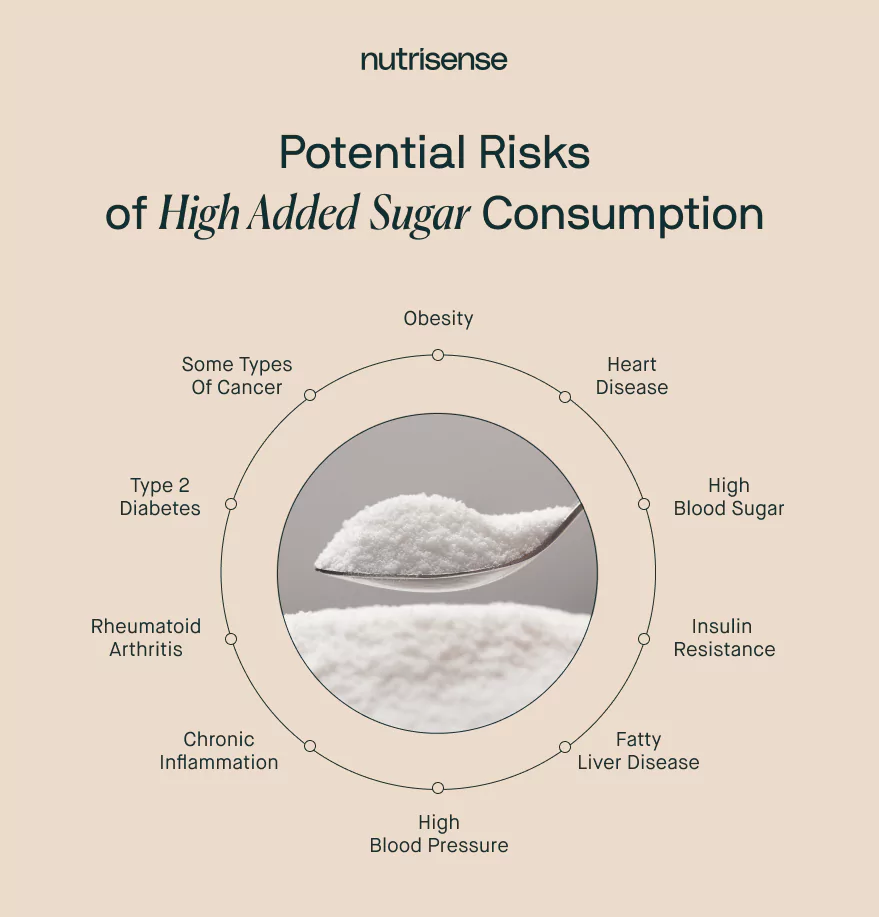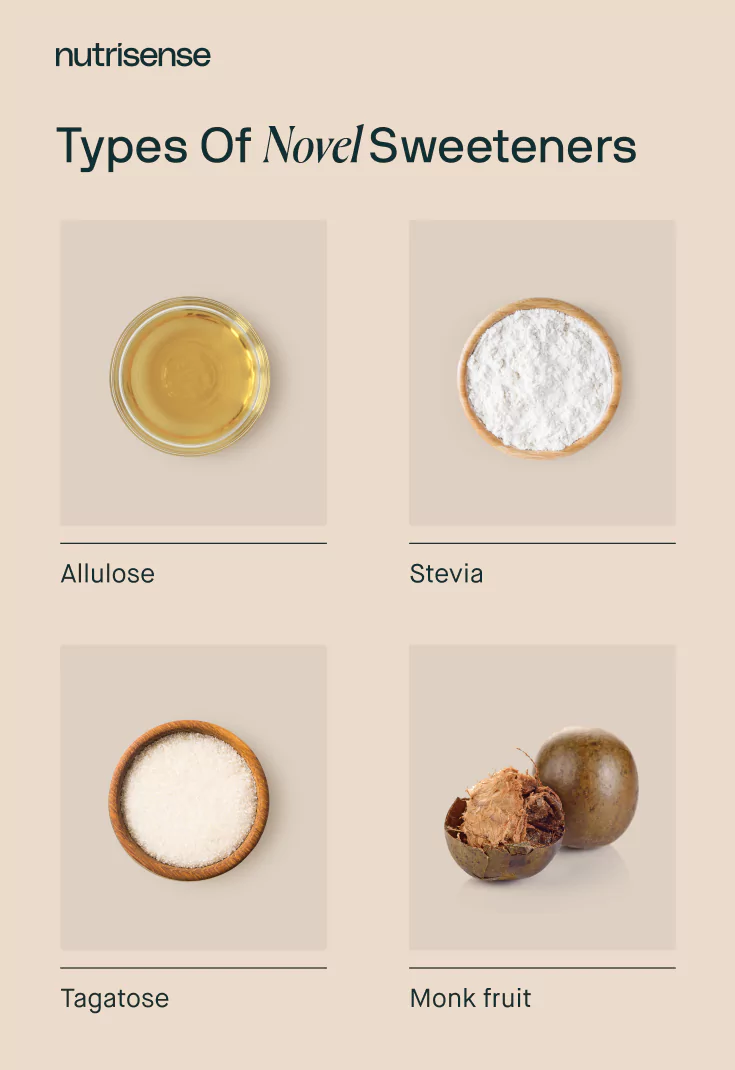5 Healthy Sugar Substitutes to Try

Key Takeaways
If you are looking to eat less refined sugars but still want to enjoy some sweetness every now and then, you may be wondering if sugar substitutes are a healthy option.
Sugar substitutes often have fewer calories than sugar, have a lower glycemic index, and can satisfy your sweet tooth just as well. But with so many to choose from, it can be hard to know which sugar alternatives are healthy.
Read on to learn more about sugar substitutes, their benefits, and five types you might want to try.
Why Should I Use a Sugar Substitute?
Did you know that the average American consumes 77 grams of added sugar per day? This is more than three times the amount of sugar recommended for women. This is a frightening statistic, and even more worrisome is that much of this sugar intake comes in the form of added sugars.
Unlike natural sugars, which are found naturally in foods like fruit, added sugars have been added to a food or beverage after it has been produced or prepared. These can range from table sugar to high-fructose corn syrup.
A diet high in added sugars can increase your risk for many serious health conditions, including:

- Heart disease
- High blood sugar
- High blood pressure
- Insulin resistance
- Fatty liver disease
- Obesity
- Chronic inflammation
- Type 2 diabetes
- Some types of cancer
The American Heart Association recommends limiting your added sugar consumption to no more than six percent of your daily calorie intake. For most people, that means eating no more than 100 calories of sugar per day, which equals about six teaspoons or 25 grams of sugar.
Sugar substitutes are sweeteners that taste very similar to sugar and can be used in its place in a variety of foods. Because many of them have zero calories, they may be a good alternative to refined sugars for people who want to reduce or limit their added sugar intake.
Many of them also have little to no effect on blood sugar and insulin production, making them safer for people who have diabetes and hyperglycemia. The majority of sugar substitutes do not interact with the bacteria in our mouths in the way that sugar does, which means they can also be much better for dental health than regular sugar.
4 Types of Sugar Substitutes
Sugar substitutes can be either natural or artificial, but because the terminology used around sugar substitutes can be inconsistent and differ from brand to brand, it can often be a little confusing to know which is which.
Let’s take a moment to learn about some of the different categories of sugar substitutes.
Natural Sweeteners
Natural sweeteners are those that come from natural sources that contain calories and nutrients that are metabolized by the body. Here are some examples of widely available natural sweeteners.

- Agave nectar
- Raw honey
- Date sugar
- Maple syrup
- Molasses
- Sorghum
- Stevia
Many natural sweeteners come from plant sources. Natural sweeteners are often promoted as healthier than artificial sweeteners, but keep in mind that many of them, including stevia, undergo processing and refining.
Artificial Sweeteners
Artificial sweeteners are synthetic sugar substitutes that have zero or very few calories. They are about 200 times sweeter than sugar, meaning that you usually have to use less of them to get the same effect as sugar.
Here are some common artificial sweeteners.

- Aspartame (Equal)
- Sucralose (Splenda)
- Saccharin (Sweet’N Low)
Artificial sweeteners are regulated by the United States Food and Drug Administration as food additives. They have been the subject of a lot of controversy over the years, with some studies showing that they cause health problems, like the development of tumors in rats.
However, this research is heavily debated and has not been consistently proven. Some artificial sweeteners have also been shown to contribute to weight gain.
Novel Sweeteners
Novel sweeteners such as allulose and stevia are a relatively new group of sugar substitutes. They are derived from natural sources, but are similar to artificial sweeteners in that they have very few calories.
Here are some examples of novel sweeteners.

- Allulose
- Stevia
- Tagatose
- Monk fruit
Sugar Alcohols
Sugar alcohols, also called polyols, are low calorie sugar substitutes. They can be artificially manufactured but some are found in fruit, vegetables, mushrooms, and algae.
Despite their name, they don’t contain sugar or alcohol, but rather low-digestible carbohydrates. Here are some examples of sugar alcohols that are available as sugar substitutes.

- Xylitol
- Sorbitol
- Erythritol
- Mannitol
5 Healthy Sugar Substitutes
Though there are many sugar substitutes out there, there may be some options that are better for you than others. Here are five sugar substitutes that, when used in moderation, can be part of a healthy diet.
1) Stevia

Stevia is a natural sweetener with zero calories. It is derived from a perennial shrub called Stevia rebaudiana and is often said to have a distinct aftertaste.
The sweetness in Stevia comes from compounds called stevioside and rebaudioside A and C, which are 200 to 300 times sweeter than sugar. It is available as a tabletop sugar, and is used as a sugar substitute in a number of commercial foods and beverages.
Stevia has been shown to have a positive effect on blood sugar management and may also be a better option for people with high blood pressure. It’s also been shown to have little to no effect on insulin production, making it a more healthy alternative for people with diabetes and hyperglycemia.
2) Erythritol
Erythritol is a low calorie sugar alcohol synthesized from dialdehyde starch. This sugar substitute is used in a number of commercial products, including gum, mouth wash, candy and frozen desserts.
Like other sugar alternatives, erythritol is also anti-cariogenic, so it does not have a negative effect on dental health. This sweetener also doesn’t have an effect on glucose or insulin levels, making it a good option for people trying to manage their blood sugar.
Some research has shown that it may have a positive effect on heart health, but more research is needed to establish a definitive link.
3) Xylitol

Xylitol is another low-calorie sugar alcohol that is used in many commercial products, like sugar-free candy, gum, baked goods, and beverages. Because it can have a positive effect on dental health, it is also used in many dental products like toothpaste and mouthwash.
Xylitol can have a positive effect on glucose tolerance and may help balance the bacteria in your gut biome. However, xylitol and other sugar alcohols have been linked to irritable bowel syndrome, bloating, gas, and other gastrointestinal issues so it is best to use it in moderation.
One important thing to note is that xylitol is highly toxic to dogs and can cause a dangerous drop in their blood sugar. Make sure to keep products that contain xylitol out of reach of pets.
4) Monk Fruit
Monk fruit extract, also called Luo Han Guo, is a type of fruit native to Southern China. Its sweetness comes from bioactive compounds called mogrosides, which are 100 to 250 times sweeter than sugar.
This zero calorie sweetener has not been found to have a significant effect on blood sugar. Monk fruit sweetener is used as a sugar substitute in many products, including beverages, desserts, jams and jellies, and candy.
The research on the effects of monk fruit is limited in humans, but it has been used for hundreds of years in traditional Chinese medicine. Because they are antioxidants, the mogrosides present in monk fruit may have a positive effect on inflammation.
They may also be anticarcinogenic and have antidiabetic effects.
5) Yacon Syrup

Yacon syrup comes from the yacon plant, which is native to South America. It is used there as a medicine to treat diabetes, constipation, and other health problems.
Yacon syrup is available to purchase in many grocery and health food stores and can be used to sweeten your morning coffee or tea, in baking recipes, in smoothies, or on top of pancakes. Some studies show that yacon is also effective at relieving and preventing constipation.
Yacon contains many antioxidants and other healthy compounds, such as fructooligosaccharides, which can positively affect your gut bacteria, balance the ph in your colon, and increase your body’s immune response.
What is the Healthiest Sweetener to Replace Sugar?
While sugar substitutes can help reduce sugar cravings, there is no one sugar substitute that is healthier than any other. What is healthiest for you will depend on your preferences, your unique health needs, and how you plan to use it
Many of the options we’ve outlined here have a number of positive health effects, and they are all considered safe when consumed in moderation. Let’s recap some of the biggest benefits that may be derived from using sugar alternatives.
Benefits of Using Healthy Sugar Substitutes
Replacing regular sugar with a healthy sugar substitute can have a number of health benefits. Here are a few ways that switching to a sugar substitute may benefit you:
Weight Loss

A diet high in added sugar can contribute to weight gain and obesity. This is partly due to the fact that high amounts of sugar can lead to leptin resistance.
Leptin is a hormone that helps maintain body weight by signaling fullness, suppressing hunger, and regulating your energy. If your body doesn’t respond to leptin, it can lead to overeating and weight gain.
Sugar is also high in calories, an excess amount of which can lead to weight gain. Many natural sugar substitutes have very little to no calories and are not absorbed by the body, and are not likely to have a negative effect on weight.
Dental Decay Prevention
When the bacteria in our mouths metabolizes sugar, it produces an acid that demineralizes the hard tissue of our teeth. This can lead to cavities and tooth decay.
However, many sugar substitutes are non-cariogenic, meaning that the bacteria in our mouths does not metabolize them and they do not contribute to tooth decay.
Blood Sugar Control

A diet high in added sugars can increase the risk of insulin resistance, high blood sugar, and type 2 diabetes. And as we now know, because many sugar substitutes are not digested or absorbed into the bloodstream, they have little to no effect on blood sugar and insulin production.
This means that sugar substitutes can potentially help to reduce the risk of diabetes and hyperglycemia.
Find the right Nutrisense programto turn insight into progress.
Go Beyond Glucose Data with Nutrisense
Your glucose can significantly impact how your body feels and functions. That’s why stable levels are an important factor in supporting overall wellbeing. But viewing glucose isn't enough. Nutrisense, you’ll be able to learn how to use your body's data to make informed lifestyle choices that support healthy living.
One-to-one coaching
Sign up to access insurance-covered video calls to work with a glucose expert: a personal registered dietitian or certified nutritionist who will help tailor your lifestyle and diet to your goals.
Monitor and measure what matters
With the Nutrisense CGM Program, you can monitor your glucose with health tech like glucose biosensors and continuous glucose monitor (CGM)s, and analyze the trends over time with the Nutrisense App. This will help you make the most informed choices about the foods you consume and their impact on your health.
Find your best fit
Ready to take the first step? Start with our quiz to find the right Nutrisense program to help you take control.

Jordyn has a bachelor’s degree in biology, a graduate degree in Human Nutrition and completed a dietetic internship at the Memphis VA. She's a dietitian at Nutrisense, and has experience working as a clinical dietitian at a VA medical center specializing in oncology and at the Mayo Clinic, working with a wide range of patients ranging from neonates in the NICU to adult ICU.




